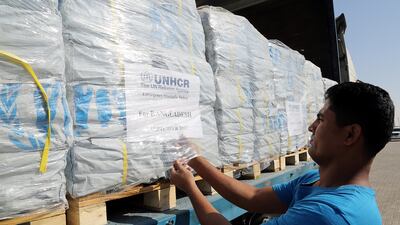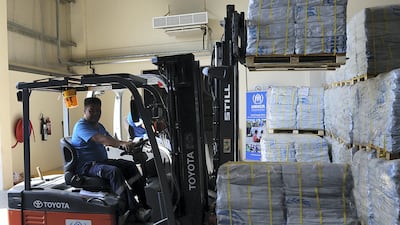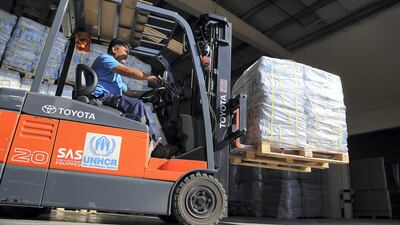Life-saving aid shipped from International Humanitarian City to more than 500,000 Rohingya refugees fleeing persecution and violence in Myanmar is being part-funded by Bangladeshi workers in Dubai.
Operations managers at the United Nations High Commissioner for Refugees took a call from a group of workers who wanted to donate Dh25,000 to help pay for shelter, food and clothing for the refugees spilling over the border into their native Bangladesh.
The anonymous workers wanted to help those facing an uncertain future amid a gruelling monsoon season, people who have been driven out by the Myanmar regime.
The third aid flight in as many weeks is due to leave on Tuesday morning from Dubai International Airport to Dhaka, where it will then be transported to Chittagong to help the growing legion of refugees there.
Aid including 24,670 plastic tarpaulin sheets will help 123,350 people who have arrived at existing refugee camps in the south east of Bangladesh.
The total aid package, including temporary shelters and sleeping mats, is worth US$325,644 (Dh1.2 million).
“To send these items by sea, it would take up to four weeks,” said Muhammad Yaqoob, senior global supply officer at the United Nations High Commissioner for Refugees.
“By flying out the supplies, it takes just five hours and that can mean the difference between life and death.
“This emergency came all of a sudden, no one was ready for it, so we need more contributions and donations.”
Mr Yaqoob said he took a phone call on Sunday from a group of Bangladeshi workers who said they had collected some money to help. The gesture brought him to tears.
“They wanted to help but I realised this was a large part of their salaries,” he said.
“They acted as an example to all of us. People want to help.
___________________
Read more:
Violence drives almost half of Myanmar's Muslims away in less than a year
Bangladesh hospital overflows with persecuted Rohingya - video
Aid for Rohingya refugees finally arrives in Bangladesh
___________________
“These guys wanted to donate Dh25,000 collectively but were earning just Dh500 a month.”
Just US$50 will provide 50 sleeping mats, and that will mean people do not have to sleep on the bare ground. Temporary shelters cost about $250, so the workers’ donation is significant.
The flights out to Dhaka are being taken care of by the Dubai Government.
Fighting erupted in the Rakhine state in Myanmar in August, forcing many from their homes and across the border to relative safety.
A trickle of refugees has rapidly escalated into a deluge, and Dubai is now playing a key role in helping those refugees find shelter as seasonal torrential rains are likely to last up to three months.
Shelters are now at breaking point, and in urgent need of reinforcement and supplies.
Heavy rain and mud is making transporting aid challenging but it is an area in which UNHCR is becoming adept.
“Many of the existing refugees are taking in other families, while others are just hanging on the local streets, so it is very important we get these temporary shelters to where they are needed most,” said Toby Harward, head of the UNHCR in Abu Dhabi.
“We have procedures in place to deal with these situations as quickly as possible, and we are experienced now in this area as it is not the first refugee influx.
“My teams have reported people in real dire straits, with fathers and sons taking turns to carry their mothers with swollen feet who are unable to walk.
“They are walking over mountain ranges and forests for days, so they are arriving in Bangladesh in a very poor state.”
UNHCR site planners are on the scene to try to help organise a 2,000-acre (800-hectare) site allocated by authorities for new arrivals.
Known as the Kutupalong extension, the site is next to Kutupalong camp, which houses Rohingya refugees who arrived over several decades. It is managed by the Bangladeshi government and supported by UNHCR.
Refugees are being biometrically measured at the camps to assess total numbers requiring help.
Due to its location, Dubai has become a crucial hub for global aid relief. It can receive goods easily by sea at Jebel Ali Port, and fly them out to crisis areas within just a few hours.
The UNHCR has helped in recent relief efforts in Sudan, Ecuador and Nepal. There are about six core-relief stockpiles with essential necessities ready for deployment from Dubai.
“Dubai is critical for this situation, as an oasis of peace in a cauldron of violence,” said Mr Haward.
“The rainy season is making road transport of shelter very difficult. We want to help with long-term survival of these people and the shelters will help with that.”
To donate to the UNHCR relief programme, visit donate.unhcr.org/gu-en/rohingya.










